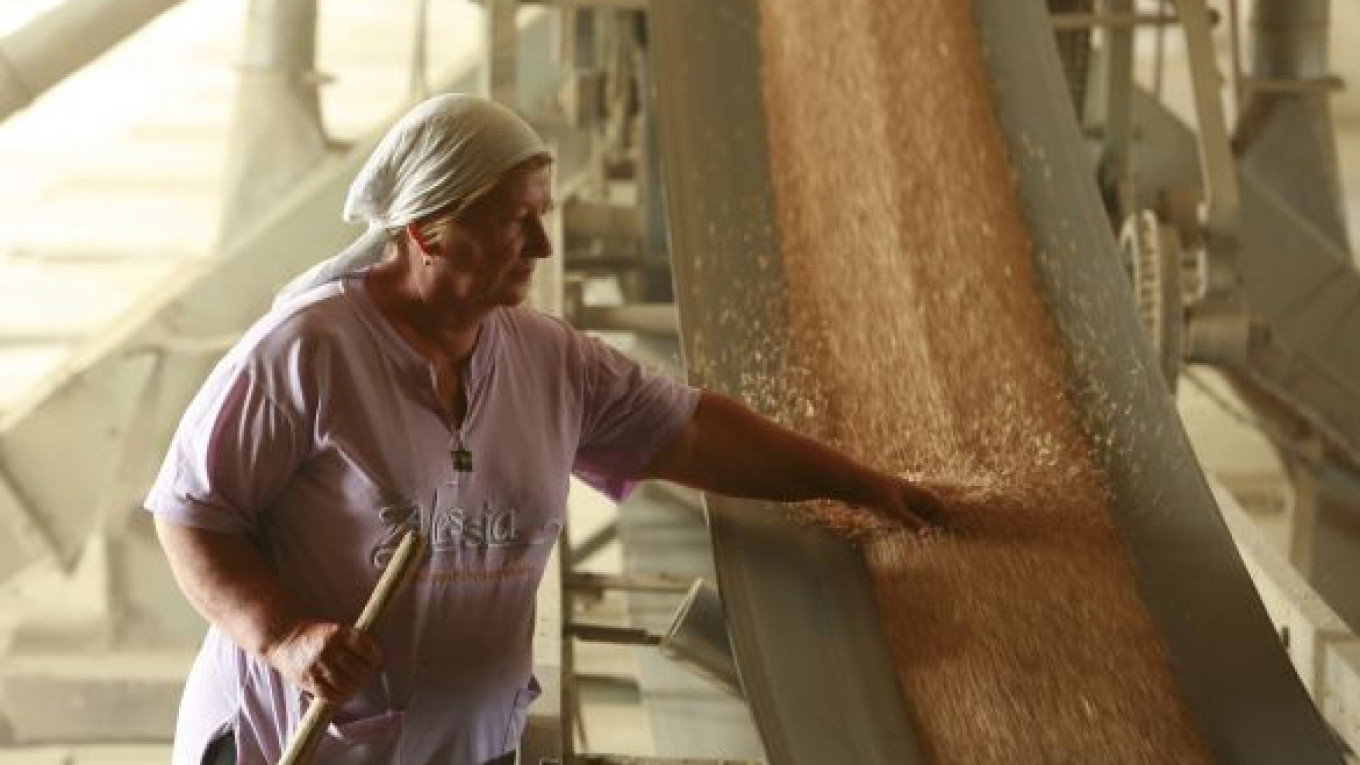Russia will sharply increase imports of agricultural goods this season and may become a net importer of grain for the first time in 11 years as a severe drought continues to ravage the harvest, analysts said Wednesday.
The possibility comes just over a year after Russia pledged to double grain exports within 15 years to help improve global food security. Local grain powerhouses Ukraine and Kazakhstan were invited in June 2009 to help Russia form a supply pool that would stabilize prices and boost export opportunities.
Imports of barley alone — a key ingredient for the country’s booming beer industry — may rise more than tenfold to 700,000 tons this marketing year, from 50,000 tons a year before, according to SovEcon, an agricultural market researcher.
It is now looking very likely that Russia will become a net grain importer for the marketing year, which started July 1, said Andrei Sizov Jr., managing director of SovEcon.
Dmitry Rylko, director of the Institute for Agricultural Market Studies, a research center, was more cautious, although he agreed that the possibility could “not be ruled out.”
Russia has not imported more grain than it exported since the 1998-99 marketing season, he said.
The Agriculture Ministry said last week that Russia might export 4.5 million metric tons of grain at most from July this year to the end of June next year.
It had already exported 3.6 million tons before a grain export ban entered force Sunday. The ban will last at least till the end of this year.
Barley crops are expected to be some of the worst in the past 40 years, dwindling by nearly half to 8.7 million to 9.3 million metric tons this season, compared with 17.9 million metric tons a year before, SovEcon said. As a result of Russia’s drought, the world grain market overheated in late July, with barley prices in Russia doubling from June, Sizov said.
The country’s intervention stock of 1.45 million tons of barley is unlikely to go on sale in full this season, SovEcon said Monday. Part of it may be deposited for the next marketing year, since the weather conditions for the sowing of winter crops remain unfavorable in a number of regions, it said.
SABMiller, a producer of beer brands including Zolotaya Bochka, Miller and Holsten, said it was possible for their prices to grow because of the more expensive barley.
“The increase of the barley and malt prices may affect our pricing policy, but it’s too early to judge,” the company told The Moscow Times in an e-mailed statement.
SABMiller, which buys its malt from suppliers, said the suppliers were planning to increase imports of barley, although they have not yet gone through stocks secured last year.
Turkey’s Anadolu Efes Biracilik & Malt Sanayii, majority owner of Russia’s Efes brewery, will raise its beer prices in Russia, the Turkish company’s chairman, Tuncay Ozilhan, said in an interview to a Turkish newspaper published last week. Russia’s Efes declined comment Wednesday.
Denmark’s Carlsberg, the producer of Baltika, said Tuesday that the more expensive barley would not have a “material impact” on the company. The St. Petersburg-based Baltika brewery did not respond to a request? for comment by Wednesday evening.
Beer prices have already grown sharply after a threefold increase of the excise tax on the beverage, which went into effect Jan. 1. Barley consumption might have been higher this season if it had not been for a 10 percent contraction in beer brewing in the first half of this year caused by the tax hike, the Russian Beer Union told The Moscow Times in an e-mailed statement.
Any further increases in prices will not be big because barley accounts for a very modest share of production costs, Sizov said.
A major price hike would also reduce consumption, which producers want to avoid, Rylko said.
In addition to barley, Russia will import “significantly” more potatoes, onions, cabbage, beets and carrots — mostly from Europe, Rylko said, adding that the country would also need to take deliveries of 2.5 million tons of sugar from abroad.
Several major Russian corn consumers are hoping to import the grain this season to feed their livestock, the U.S. Grains Council said Monday. Potential suppliers include the United States, it said.
Domestic suppliers are holding on to their corn because they expect prices to go higher, said Alex Kholopov, a consultant at the council.
“This leaves many Russian animal farmers in a panic and fearful,” he said in comments on the council’s web site.
Russia imported 38,000 tons of corn in 2009, according to the State Statistics Service.
A Message from The Moscow Times:
Dear readers,
We are facing unprecedented challenges. Russia's Prosecutor General's Office has designated The Moscow Times as an "undesirable" organization, criminalizing our work and putting our staff at risk of prosecution. This follows our earlier unjust labeling as a "foreign agent."
These actions are direct attempts to silence independent journalism in Russia. The authorities claim our work "discredits the decisions of the Russian leadership." We see things differently: we strive to provide accurate, unbiased reporting on Russia.
We, the journalists of The Moscow Times, refuse to be silenced. But to continue our work, we need your help.
Your support, no matter how small, makes a world of difference. If you can, please support us monthly starting from just $2. It's quick to set up, and every contribution makes a significant impact.
By supporting The Moscow Times, you're defending open, independent journalism in the face of repression. Thank you for standing with us.
Remind me later.


